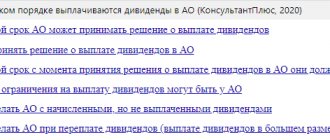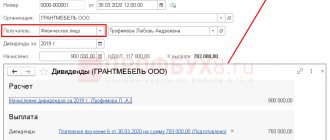Explanations to the Balance Sheet and Statement of Financial Results
If annual dividends for the reporting year are declared before the financial statements are signed, this is an event after the reporting date and is subject to reflection in the notes to the Balance Sheet and the Statement of Financial Results. In accounting, this operation is carried out during the dividend accrual period.
If declared but unclaimed dividends were restored during the reporting period, this must also be described in an explanation. This way you will reveal the reasons for the discrepancy between the net profit of the Income Statement and the Balance Sheet data.
Dividends have been accrued but not paid, what to do?
“…..p.16. If the person for whom the personal account (custody account) was opened has not provided information about changes in his data, the issuer (the person obligated under the securities), the Registrar and the depositary are not liable for losses caused to such person due to failure to provide information. » To receive accrued but unpaid dividends for past periods due to outdated or incorrect details contained in the register, persons who sold shares of the Company must submit a Registered Person's Questionnaire, indicating the correct details for transferring dividends, a Receipt for payment for the Registrar's services and an Application for repayment of dividends. The shareholder signs the Registered Person's Questionnaire in person in the presence of an authorized representative of the Registrar or certifies the authenticity of his signature by a notary. Dividends will be paid within the month following the month in which the Questionnaire and application were executed by the Registrar.
Other forms of financial statements
Accrued dividends are also reflected in the Statement of Changes in Capital. For this purpose, line 3327 “Reduction of capital - dividends” is intended here. There are no special features when filling out this indicator.
And reflect the amount of dividends paid on line 4322 “Payments for the payment of dividends and other payments for the distribution of profits in favor of owners (participants)” of the Cash Flow Statement.
When filling out this report, remember that we are talking about cash flow here. Therefore, you need to show the payment of dividends only in cash. If dividends are issued by property, they are not shown in the Cash Flow Statement.
Read in the berator “Practical Encyclopedia of an Accountant”
How to fill out a capital flow statement
How to fill out a cash flow statement
Refused dividends
Should personal income tax be withheld from the amount of dividends if an individual refuses to receive them? At first glance, the answer seems obvious: if an individual did not receive income, then the subject of personal income tax did not arise.
However, the letter of the Ministry of Finance of Russia dated October 4, 2010 N 03-04-06/2-233 states that personal income tax must be withheld. In this case, the day of refusal to receive dividends will be considered the day of actual receipt of income. How so? To understand what the Russian Ministry of Finance wanted to say, it is necessary to understand the situation itself. In accordance with Art. 42 of the Federal Law of December 26, 1995 N 208-FZ “On Joint-Stock Companies,” the general meeting of shareholders may decide to pay dividends on outstanding shares. At the same time, at the same meeting, a list of persons entitled to receive dividends is formed
in the manner and within the time limits established by the charter of the company or determined at the meeting. If the company's charter does not specify the period for payment of dividends, the period for their payment should not exceed 60 days from the date of the decision to pay dividends. Let us explain that the specified period - 60 days - is established for the company itself, that is, it is reserved for resolving issues related to the preparation of the necessary documents.
The company is obliged to pay dividends declared on shares of each category (type). Thus, in the accounting records on the date the general meeting of shareholders made a decision on the payment of dividends, an entry is made regarding the accrual of dividends for payment. At the same time, for the purpose of calculating personal income tax, the date of actual receipt of income in cash is defined as the day of payment of income, including the transfer of income to the taxpayer’s bank accounts or, on his behalf, to the accounts of third parties (subclause 1, clause 1, article 223 of the Tax Code of the Russian Federation) . That is, the Tax Code distinguishes between the concepts “accrued for payment” and “paid.”
Further options are possible. If it is assumed that each of the shareholders must independently apply to the company to receive the dividends due to them, then personal income tax on the specified amounts can only be calculated on the day of actual payment. This, in particular, is indicated in the letter of the Ministry of Finance of Russia dated January 11, 2006 N 03-05-01-04/1: withholding personal income tax when preparing a statement for the payment of dividends, that is, until the date the taxpayer actually receives income, does not comply with the law.
What happens to the accrued amounts if the shareholder never applies for dividends? The amounts of declared but not actually paid dividends form the organization's accounts payable. After the expiration of the limitation period, which in the case under consideration is determined in accordance with Art. 196 of the Civil Code of the Russian Federation and lasts for three years, the amounts of unclaimed dividends are subject to inclusion in the non-operating income of the company.
So, in the case considered, the shareholder did not officially refuse to receive dividends, he simply ignored them. There was no need to calculate personal income tax and, accordingly, withhold it and transfer it to the budget. If the general meeting of shareholders determines a different procedure for paying dividends, for example by transferring them by mail, the day of sending the postal order will be considered the date of actual receipt of income. On this date, it is required to calculate personal income tax, which is withheld from the amount due to the shareholder and transferred to the budget. That is, the dividend recipient receives not the entire accrued amount, but minus the withheld tax. If the postal order is not received by the addressee, the funds will be returned to the organization and will be included in non-operating income. However, the amount of personal income tax transferred to the budget cannot be qualified as excessively withheld and is not subject to return. The Russian Ministry of Finance explained this in its letter dated November 2, 2007 N 03-04-06-01/375.
Indeed, from the point of view of the Tax Code, in the case when an individual has a real opportunity to take advantage of the amounts due to him (no one is stopping him from going to the post office and receiving dividends), the income is considered received by him. Let us note that taxation issues are also resolved in the case when an employee does not apply to receive the accrued wages that are on deposit.
And finally, the situation with which we started. The key point is that the shareholder has refused to receive dividends. To refuse means to officially notify the company that, knowing about his right to receive the amounts due to him, the shareholder is not going to exercise this right and invites the company to dispose of the corresponding amounts at its own discretion or to direct them to the purposes specified by the shareholder. In order to avoid any further claims from the shareholder, the company must receive a corresponding statement from him in writing.
Can an individual give up something that does not originally belong to him? No. Moreover, he cannot give any orders regarding amounts that do not belong to him. That is why the Russian Ministry of Finance indicates that the day of refusal (the day of filing the corresponding application) of an individual to receive dividends should be considered the day of his actual receipt of income and, therefore, the date on which the amount of personal income tax is calculated, withheld and transferred to the budget. In other words, an individual has the right to dispose only of the income that belongs to him, on which personal income tax has been paid.
Note that an essentially similar answer was given earlier, only the question was formulated differently. At what rate is the amount of accrued dividends subject to personal income tax if the general meeting of shareholders decided that part of the dividends will be used to purchase preferred shares? The letter of the Ministry of Finance of Russia dated November 13, 2007 N 03-04-06-01/381 explained that income received in the form of dividends is subject to taxation on personal income tax at the rate provided for in paragraph 4 of Art. 224 of the Tax Code of the Russian Federation, regardless of the procedure for using dividends, including when they are used to purchase preferred shares.
Summarize. If the shareholder has not informed the company that he will not receive dividends, then it cannot be argued that he has refused to receive them. The amount of dividends is considered unclaimed and forms the organization's accounts payable. In this case, the organization will be able to use the corresponding amount at its discretion no earlier than three years later, that is, after the expiration of the statute of limitations. In this case, personal income tax is not withheld from the unclaimed amount.
If the shareholder officially declared that the company has the right to dispose of the dividends due to the shareholder at its own discretion, then the corresponding amounts are subject to taxation. At the same time, the company can use the remaining funds, although reduced by the amount of personal income tax, immediately, and not after three years.
It remains only to express regret that the answers given by official bodies often require additional clarification.
www.palata-nk.ru
Consultations (question-answer)
Dividends, the decision on payment (declaration) of which was made by the general meeting of shareholders, are subject to payment within the period determined by the charter of the company or the decision of the general meeting of shareholders. If such a period is not defined by the charter, it should not exceed 60 days, including when it is established by a decision of the general meeting. Making a decision on the payment of annual dividends, the amount of the annual dividend and the form of its payment (cash or other property) for shares of each category (type) falls within the competence of the general meeting of shareholders. In this case, the amount of annual dividends cannot be more than recommended by the board of directors (supervisory board) of the company.
21 Dec 2021 marketur 153
Share this post
- Related Posts
- When does the law come into effect in court?
- Dental treatment tax benefits
- How to calculate the percentage for submitting form 1 ki in the cz for a quota
- Payments for the Combat Medal of the Order of Merit
Salaries are not paid on time: in what month does the employee’s income arise?
Situations like the one under consideration arise because there is a gap established by the Tax Code of the Russian Federation between the deadline for calculating tax in one month, for example in December, and its withholding and transfer in another month, for example in January of the next year. Moreover, the same thing happens throughout the year: the tax is calculated, for example, in January, but is withheld and transferred in February. And this is a normal situation. After all, organizations calculate personal income tax amounts on an accrual basis from the beginning of the year based on the results of each month in relation to all accrued to an employee for a given period, for which a rate of 13% is applied, with offset of the amount of personal income tax withheld in the previous months of the current year and clause 3 of Art. 226 Tax Code of the Russian Federation.
“ Firstly, the Letter of the Federal Tax Service dated October 7, 2013 No. BS-4-11 / [email protected] sets out a position that relates to a specific situation. Secondly, the answer is formulated a little incorrectly. Thus, according to the norms of the Labor Code, the employer pays wages at least every half month - on the day established by the employment contract (internal labor regulations, collective agreement) part 6 of Art. 136 Labor Code of the Russian Federation. That is, the employer does not have the right to violate the requirements of the Labor Code of the Russian Federation regarding the timing of salary payments. But if this happens, then wage arrears arise.
Distributing net profit
The right to distribute profits belongs to the owners of the company (subclause 3, clause 3, article 91, subclause 4, clause 1, article 103 of the Civil Code of the Russian Federation). To do this, they must hold a general meeting. In a joint-stock company, it is carried out no earlier than two months and no later than six months after the end of the financial year (clause 1, article 47 of the Federal Law of December 26, 1995 No. 208-FZ “On Joint-Stock Companies”, hereinafter referred to as Law No. 208 -FZ). In limited liability companies, the period for holding annual meetings is shorter - from March 1 to April 30 (Article 34 of the Federal Law of 02/08/98 No. 14-FZ “On Limited Liability Companies”, hereinafter referred to as Law No. 14-FZ). By the way, according to the Ministry of Finance, dividends from the net profit of previous years can be paid only if this profit was not previously used to form funds. For example, a corporatization fund for employees of a joint-stock company. Otherwise, payments as dividends are not considered and, accordingly, are taxed at regular rates (clauses 1, 2 of Article 35 of Law No. 208-FZ, letter of the Ministry of Finance of Russia dated 03/20/2012 No. 03-03-06/1/133, dated 04/06/2010 No. 03-03-06/1/235).
Payment of dividends in the absence of profit or - money
• a certificate about creditors (with a breakdown of the amounts and terms of debt) and about the expected receipts of money. That is, the LLC must have enough funds for settlements with creditors (to prevent delays in repaying debts exceeding 300,000 rubles for more than 3 months) and for paying dividends; If, despite the restrictions in the Law on LLCs, a decision on dividends is still made and they are paid, then subsequently, if the LLC is declared bankrupt, the arbitration manager of the LLC may try to challenge such a decision (payments from) paragraphs. 1, 3 tbsp. 61.1, paragraph 2 of Art. 61.2, paragraphs. 1, 2 tbsp. 61.9 of Law No. 127-FZ; clause 6 of the Resolution of the Plenum of the Supreme Arbitration Court of December 23, 2010 No. 63. And if this works out, the participants will have to return the money, since they are part of the bankruptcy estate of the LLC, clause 2 of Art. 167 Civil Code of the Russian Federation; clause 1 art. 61.6 of Law No. 127-FZ.
Please note => When will sales of discounted tickets to Crimea from Samara begin?
Violation of the deadline for paying dividends to a shareholder
Relations regarding the payment of dividends to a company participant are not related to the sale of goods, works, services and cannot lead, for profit tax purposes, to the emergence of doubtful debts or bad debts. Thus, according to the Ministry of Finance, dividends that were not received by the company are not taken into account for profit tax purposes as expenses equated to losses. This is precisely the situation that the Ministry of Finance considered in letter dated September 19, 2011 N 03-04-06/3-225. At the same time, officials indicated that violation of the dividend payment deadline does not affect the income tax rate established for this type of income. However, we note that in this particular case, the organization that asked the question to the Ministry of Finance protected itself by collecting relevant statements from all participants. In the letter, the financiers also recalled that, according to Article 15.20 of the Code of Administrative Offenses of the Russian Federation, failure by a joint-stock company to pay declared dividends within 60 days is a violation of the legislation of the Russian Federation; such a joint-stock company may be subject to administrative punishment in the form of a fine in the following amount: for officials - from 20,000 to 30,000 rubles, for legal entities - from 500,000 to 700,000 rubles.
Please note => Who is entitled to a preferential pension in the Republic of Belarus?
Refusal in favor of another participant, third party
Sometimes participants are ready to redistribute dividends among themselves in a manner different from that specified in the constituent documents. This situation has not been resolved by legislators, and the company also does not have the right to take upon itself the solution of such an issue. How to proceed?
If the decision is reflected in the decision of the general meeting
The participants voted for the redistribution of income - from the point of view of legislation (Article 28 of Law No. 14-FZ), another distribution disproportionate to shares is possible only with a unanimous decision of all founders, and if such a possibility is stated in the Charter of the company. Otherwise, the document can be appealed in court. There are no ambiguities for the company - it will calculate and transfer the amounts due in accordance with the decision, withhold and transfer the due tax from the participant receiving the funds.
Refusal of dividends by a participant in favor of another person
A participant who decides to reduce his share of dividends in whole or in part for someone else’s benefit has the right to write an application for their transfer to the account of a third party, even another participant. The organization is obliged to comply with such a written order, while withholding personal income tax or income tax from the accrued amount.
Thus, persons receiving dividends have the right to independently decide who will receive them and how. And taxation will directly depend on the option of registering the refusal.
Restrictions on dividend payments for LLCs
Lawyers on our portal are often asked the question of how much money an LLC should pay dividends from. The law indicates that only net profit (i.e. assets, after payment of all relevant taxes) can be taken into account as income distributed among members of an LLC.
- The start-up capital of the LLC has not been fully paid.
- Before the full value of the share has been paid in cases prescribed by law.
- At the time of the decision, the LLC has grounds for bankruptcy.
- The cost of net profit is less than the starting capital and reserve fund.
On the accrual and payment of dividends to LLC owners
If the owner is a foreign organization, the tax rate is 15% . It is worth considering that there may be international treaties that have higher priority than national legislation. In other words, if there is an agreement on the avoidance of double taxation then its rules should be applied. The tax agent is obliged to report to the Federal Tax Service on dividends paid to individuals. These amounts are included in 2-personal income tax with the sign “1” , indicating that the tax was withheld. The form must be submitted by April 1 of the following year. In addition, dividends are included in Form 6-NDFL .
Please note => Do they provide Vouchers to the Sanatorium of the Ministry of Internal Affairs for the Children of an Employee?
Accrued dividends not paid
This is a fairly common situation when amounts are accrued to the owners, but not paid. This may occur due to the fact that the organization itself, for some reason, missed the deadline for transferring the amounts, or if the recipient of the dividends can refuse them if desired. As for tax accounting under the simplified taxation system, the restored amount of dividends will not be considered income under “simplified taxation” (subclause 1, clause 1, article 346.15 and subclause 3.4, clause 1, article 251 of the Tax Code of the Russian Federation). Since it is not taken into account for taxation (letter of the Ministry of Finance of Russia dated February 17, 2012 No. 03-03-06/1/91).








